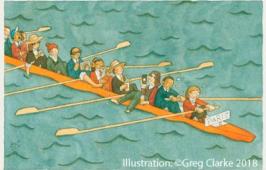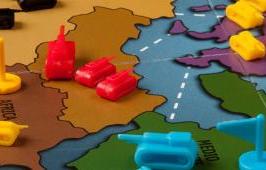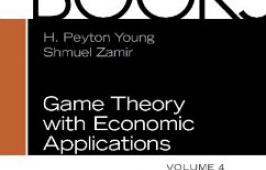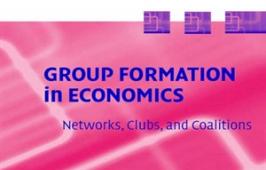Coalition Formation Theory
Coalition formation theory deals with the analysis of one or more groups of agents, called coalitions, that get together to jointly determine their actions. It is related both to cooperative and non-cooperative games, as the key concept of this theory, coalition, can be defined as a group of agents which coordinates agreements among its members, while it interacts non-cooperatively with its non-members. Although a coalition, once formed, is cooperative, its creation can take place in a non-cooperative way. Essentially, one may distinguish two main aspects of coalition formation theories. One of them concerns the formation of groups, that is, the process through which a coalition comes together to coordinate its actions. Another aspect of coalition formation theories involves the enforcement of group actions as the equilibrium of an appropriate game.
Related posts
|
Working paper The concept of semivalue of a transferable utility game has been introduced by | READ MORE ... |
Article We study the stability of overlapping group structures where each group | READ MORE ... |
Article We study a discrete model of jurisdiction formation in the spirit of Alesina | READ MORE ... |
|
From theory to application International agreements addressing climate change must overcome the | READ MORE ... |
Working paper Mauleon, Roehl and Vannetelbosch (GEB, 2018) develop a general theoretical | READ MORE ... |
Article We develop a general theoretical framework that allows us to study the group | READ MORE ... |
|
Article We study a notion of non-manipulability by groups, based on the idea that only | READ MORE ... |
Working paper This paper introduces a number of game-theoretic tools to model collusive | READ MORE ... |
Working paper I examine a setting, where an information sender conducts research into a | READ MORE ... |
|
Article We provide a new proof of the nonemptiness of approximate cores of games with | READ MORE ... |
Article It is shown that in a model where agents have single-peaked preferences on the | READ MORE ... |
Article We investigate the effect of domestic politics on international environmental | READ MORE ... |
|
From theory to application .
|
Working paper We model the structure and strategy of social interactions prevailing at any | READ MORE ... |
Working paper We propose a new solution concept for TU cooperative games in characteristic | READ MORE ... |
|
Working paper We consider a model of opinion formation based on aggregation functions. Each | READ MORE ... |
Working paper We study the impact of loss-aversion and the threat of catastrophic damages, | READ MORE ... |
Article We introduce the concept of minimal strong curb sets which is a set-theoretic | READ MORE ... |
|
Article We consider in this paper solutions for TU-games where it is not assumed that | READ MORE ... |
Article Coalitional network games are real-valued functions defined on a set of players | READ MORE ... |
Working paper It is shown that in a model where agents have single-peaked preferences on the | READ MORE ... |
|
From theory to application In November 2015, delegates from over 190 countries will meet in Paris for the | READ MORE ... |
Working paper This paper studies how the possibility for firms to sign collusive agreements ( | READ MORE ... |
Working paper We introduce a noncooperative multilateral bargaining model for a network- | READ MORE ... |
|
Article We develop a simple model to analyze the timing of contests. When the odds of | READ MORE ... |
Working paper We study the effect of leadership in an experimental threshold public ‘bad’ | READ MORE ... |
Book "A beautiful dozen. Twelve papers presented in 20 years of meetings of the | READ MORE ... |
|
Article The division problem under constraints consists of allocating a given amount of | READ MORE ... |
Interview During the 19th CTN Workshop, organized jointly by CORE (Université catholique | READ MORE ... |
New book The ability to understand and predict behavior in strategic situations, in | READ MORE ... |
|
Article We study how to partition a set of agents in a stable way when each coalition | READ MORE ... |
Working paper To study the stability of coalitions in the standard game theoretic model of | READ MORE ... |
Working paper We consider in this paper solutions for TU-games where it is not assumed that | READ MORE ... |
|
Working paper We investigate the role of networks of military alliances in preventing or | READ MORE ... |
Working paper Pairing Games or Markets studied here are the non-two-sided NTU generalization | READ MORE ... |
Book This important book, written by some of the leading scholars in the field, | READ MORE ... |
|
Book Broad and diverse ranges of activities are conducted within and by organized | READ MORE ... |
Article This article studies a model of coalition formation for the joint production ( | READ MORE ... |
Article We develop a theoretical framework that allows us to study which bilateral | READ MORE ... |
|
Working paper Coalitional network games are real-valued functions defined on a set of players | READ MORE ... |
Article We analyze how different rules for exiting an alliance affect the formation of | READ MORE ... |
Working paper The Shapley value is defined as the average marginal contribution of a player, | READ MORE ... |
|
Working paper Given a simple game, a power configuration specifies the power of each player | READ MORE ... |
Working paper The class of games with one apex player is generalized to the class of games | READ MORE ... |
Working paper We develop a theoretical framework that allows us to study which bilateral | READ MORE ... |
|
Working paper We study a framework where two duopolists compete repeatedly in prices and | READ MORE ... |
Working paper Some behaviors, ideas or technologies spread and become persistent in society, | READ MORE ... |
Working paper This paper is concerned with multistage bidding models introduced by De Meyer | READ MORE ... |
|
Working paper We present a model of adaptive economic agents that are k periods forward | READ MORE ... |
Working paper In the dynamic game we consider, players are the members of a fixed network. | READ MORE ... |
Working paper Two project leaders (or entrepreneurs) in a network, which captures social | READ MORE ... |
|
Working paper We analyze whether noncooperative collusive equilibria are harder to sustain | READ MORE ... |
Working paper We show that in large finite economies, core allocations can be approximately | READ MORE ... |
Working paper We study information revelation in markets with pairwise meetings. We focus on | READ MORE ... |
|
Working paper We develop a theoretical framework that allows us to study which bilateral | READ MORE ... |
Working paper In this paper we develop a model to analyze, in a dynamic framework, how | READ MORE ... |
Working paper We provide two new characterizations of exact games. First, a game is exact if | READ MORE ... |
|
Working paper Dynamic TU-games are considered which consist of a finite player set, a finite se | READ MORE ... |
Working paper We consider multiple-type housing markets. To capture the dynamic aspect of | READ MORE ... |
Working paper Qualitative coalitional games (QCG) are representations of coalitional games in | READ MORE ... |
|
Working paper This paper proposes new concepts of strong and coalition-proof correlated | READ MORE ... |
Working paper A model of group formation is presented where the number of groups is fixed and | READ MORE ... |
Working paper We analyze the relative importance of party ideology and rents from office in | READ MORE ... |
|
Working paper A stable government is by definition not dominated by any other government. | READ MORE ... |
Working paper This paper analyzes social group formation when agents are subject to peer | READ MORE ... |
Working paper The paper studies, in a repeated interaction setting, how the presence of | READ MORE ... |
|
Working paper We consider the class of proper monotonic simple games and study coalition | READ MORE ... |
Working paper Although global free trade is efficient, each country’s benefit from free trade | READ MORE ... |
Working paper This paper analyses strategic bargaining in negotiations between non-monolithic | READ MORE ... |
|
Working paper We provide an existence and a uniqueness result for coalitional equilibria of a | READ MORE ... |
Working paper The Flexible Mechanisms articulated in the Kyoto Protocol provide a robust | READ MORE ... |
Working paper International agreements on transfrontier pollution require approval by | READ MORE ... |
|
Working paper We propose a class of sharing schemes for the distribution of the gains from | READ MORE ... |
Working paper We study a game theoretic model of a parliamentary democracy under proportional | READ MORE ... |
Working paper Due to the externalities, in normal form games a deviation changes the payoff | READ MORE ... |
|
Working paper In this paper we provide an alternative to the generalized model of indivisible | READ MORE ... |
Working paper |
Working paper This paper proposes a one shot normal form game of agreement formation. It | READ MORE ... |
|
Working paper This paper analyzes secession and group formation in the general model of | READ MORE ... |
Working paper We analyze a situation where individuals and coalitions can obtain effective | READ MORE ... |
Working paper This work is an attempt to show a small part of the complexity prob- lems | READ MORE ... |
|
Working paper We specify an adjustment process that converges to the set of potential− | READ MORE ... |
Working paper This paper establishes sufficient conditions for the existence of a stable | READ MORE ... |
Working paper This paper looks at cooperation structures that result from a strategic game | READ MORE ... |
|
Working paper A group of agents located along a river have quasi-linear preferences over | READ MORE ... |
Working paper We illustrate one way in which a population of boundedly rational individuals | READ MORE ... |
Working paper A model of coalition government formation is presented in which inefficient, | READ MORE ... |
|
Working paper In this paper we present a structural approach to the study of government | READ MORE ... |
Working paper We examine the formation of networks among a set of players whose payoffs | READ MORE ... |
Working paper In view of the uncertainty over the ability of merging firms to achieve | READ MORE ... |
|
Working paper This paper proposes a model of multilateral contracting where players are | READ MORE ... |
Working paper We propose a framework to analyze coalition formation with heterogeneous agents | READ MORE ... |
Working paper The paper studies how does the size of a cartel affect the possibility that its | READ MORE ... |
|
Working paper This paper establishes sufficient conditions for the existence of a stable | READ MORE ... |
Working paper In a society composed of a ruler and its citizens: what are the determinants of | READ MORE ... |
Working paper We add a Principal (abstract enforcer) to any 2 person TU game in strategic | READ MORE ... |
|
Working paper This paper studies a decentralised job market model where firms (academic | READ MORE ... |
Working paper Coalition setting among a set of actors (countries, rms, individuals) is | READ MORE ... |
Working paper Players are assumed to rank each other as coalition partners. Two processes of | READ MORE ... |
|
Working paper This paper reinterprets the γ -core (Chander and Tulkens (1995, 1997)) and | READ MORE ... |






